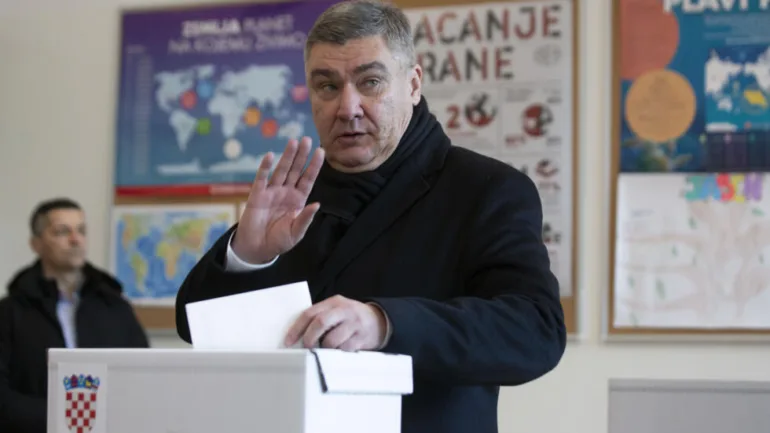Croatians voted on Sunday to elect a new president, with incumbent Zoran Milanović, known for his outspoken style, emerging as the frontrunner in opinion polls.
Milanović, who holds the support of 37% of voters, faces his likely main rival, Dragan Primorac, a candidate backed by the conservative HDZ party, which currently governs the country. Milanović’s opponent, Primorac, garnered 20% support, according to a poll released on Friday.
The election comes at a challenging time for Croatia, a European Union and NATO member of 3.8 million people, which is grappling with high inflation, widespread corruption, and a significant labor shortage.
As no candidate is expected to secure more than 50% of the vote outright, the election is likely to go to a runoff in two weeks, where the new head of state will be determined.
Throughout the campaign, Milanović and Primorac exchanged sharp barbs, with Milanović calling Primorac “boring” and “as fake as a 13-euro note.” Despite the insults, the two contenders are vying for a ceremonial post that holds significant influence over the country’s political balance.
The role of the president
While the Croatian president commands the armed forces and plays a role in foreign policy, the office’s powers are limited. Nonetheless, many view it as key to maintaining a balance of power in a country long dominated by the HDZ since independence in 1991.
“All the eggs should not be in one basket,” said Nenad Horvat, a salesman in his 40s, who sees Milanović as the “last barrier” preventing the HDZ from consolidating too much power.
Davor Kallay, an unemployed voter, expressed skepticism about the potential for change, saying, “I’ve been expecting some improvements since independence, but I’m afraid these elections won’t bring them… lower inflation, higher wages.”
Milanović: A polarizing figure
Milanović, a former left-wing prime minister, has been one of Croatia’s most prominent political figures for nearly two decades. Known for his sharp wit and eloquence, Milanović won the presidency in 2020, running as a candidate for the opposition Social Democrats (SDP) with promises to advocate for tolerance and liberalism.
However, his time in office has been marked by frequent attacks on political opponents and European Union officials, often employing populist rhetoric. Despite condemning Russia’s aggression against Ukraine, Milanović has been critical of the West’s military support to Kyiv. This prompted Prime Minister Andrej Plenković to accuse him of being “pro-Russian” and undermining Croatia’s credibility within NATO and the EU. Milanović has countered by stating his priority is to prevent Croatia from being “dragged into war.”
He has also criticized Prime Minister Plenković and the HDZ party over systemic corruption, calling Plenković a “serious threat to Croatia’s democracy” and positioning himself as the “guarantee of control” over the nation’s corruption network.
The longstanding feud
For many, this election is viewed as a continuation of the longstanding feud between Milanović and Plenković, with their rivalry dominating the political landscape. “This is still about the conflict between the prime minister and president,” said political analyst Zarko Puhovski. “All the rest are just incidental topics.”
Primorac: The HDZ’s unifier
Primorac, 59, is campaigning as a unifier, emphasizing family values, patriotism, and national unity. The physician and scientist is making a return to politics after 15 years and has framed the election as a choice between Croatia’s future alignment with the East or the West.
Primorac has accused Milanović of “disgracing Croatia,” a claim that resonates with a segment of voters, including Barbara Sente Ocvirk, 36, who told AFP she was dissatisfied with Milanović’s representation of the country both domestically and abroad.
However, critics argue that Primorac lacks the political charisma and credibility to lead effectively, and some view him as merely a tool for the HDZ to attack Milanović rather than a candidate with his own vision for the country.
The election day
Voting stations opened at 7:00 AM (0600 GMT) and will remain open until 7:00 PM local time. Exit polls are expected shortly after polls close, with official results anticipated later in the evening.
As the election unfolds, all eyes will be on whether Milanović’s popularity holds up in the second round or if Primorac can mount a successful challenge to unseat the incumbent president.
AFP


